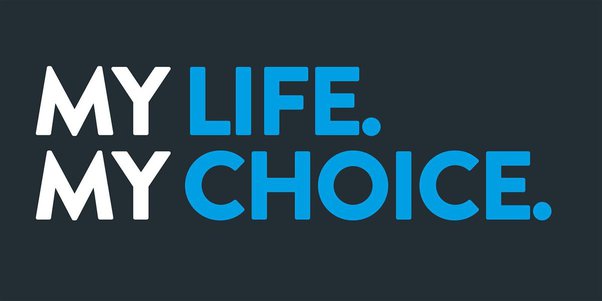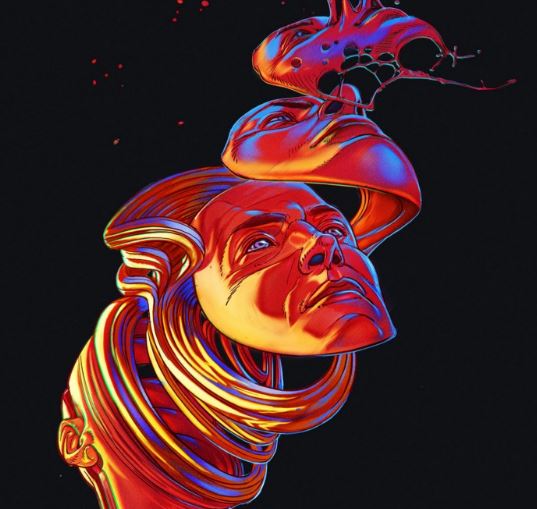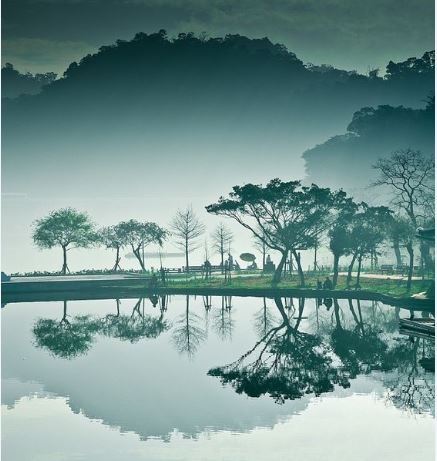Its My Life Or Is It?
Everything Does Not Revolve Around Me
We are more than our bodies, and belong to more than just this earth.

Its My Life Or Is It - The Default Setting
The way our minds work, we automatically create what we perceive to be MY life, MY job, and MY financial security and it is usually all nicely packaged up with clear boundaries defining my own personal sense of who I am and how things are.
It's my life
This perspective is popularised in modern culture by bands such as Bon Jovi "Its my life, its now or never, I ain't gonna live forever.." and in a previous age with Frank Sinatra and "My Way".
Inner map of reality
We develop our own unique inner map of reality shaped by our own personal early influences and from this we develop our own personal beliefs based on that map (largely unconsciously) to navigate us through life and primarily to keep us safe.
Functioning, as we do, in this way - things are seen as separate and largely static, our perception and general experience is that time proceeds in a linear manner from past to future, there is "me here" and the world "out there", and there are events and things that I don't like that happen to me.
This is our default setting – and so much of what we do is motivated by our deep inbuilt need to keep things as they are - to preserve the boundaries around "my life" - to preserve MY survival and MY safety and MY comfort.
Change and loss of control
So change – and especially imposed change - becomes something to be avoided and/or resisted, unless it’s on my terms and within my control.
This immediately creates a problem for most of us because we are now living through times of great turbulence and many of us are experiencing imposed change that seriously affects all areas of MY life.
The scale and pace of change that we are all experiencing is faster than our capacity to cope with it.
Its My Life Or Is It - Dropping The Ego

Alternative perspectives
But there is another perspective and one that forms a common thread in several major belief systems and philosophical outlooks.
The terminology and language is different, but as we established in The Duck Test, if they all point in the same direction to what appears to be a universal or generic truth then it is likely that is what it is.
The Christian faith, especially in the teachings of St Paul, speaks of "dying to self" and allowing the spirit, or consciousness, of Christ to live through you.
Buddhists refer to "dropping the ego" and allowing the bodhicitta [the mind of enlightenment] to develop withing you.
Both of these two phrases dying to self & dropping the ego are Christian and Buddhist expressions of the same fundamental truth - the need to correct the inbuilt, hardwired tendency to assume that everything revolves around "me".
Dying to self & dropping the ego is all about:
[1] Understanding the functions of your mind and your selves and developing a good working relationship with them.
[2] Understanding where, and why, it all goes horribly wrong because of:
- Your ego's desire to be in control,
- Your ego usurping the role of your higher self,
- Your ego disconnecting you from your true source of power.
In Zen practice "Non-Attached Mind" [Mushotoku] is a mindset that does not seek to acquire or gain anything and that has no attachment to objects and outcomes.
This mindset transcends dualities and also involves an inner letting go of the ego.
As we already noted, these alternative perspectives all point to some form of major inner realignment whereby a greater consciousness emerges and expresses itself through us. Here is a personal experience that I shared about something that happened to me about 15 years ago. The teachings in the Tao Te Ching also point to a major realignment of how we normally function. This is about a 180 degree shift from living MY life to a life that is lived by the Tao. This is difficult for the natural egoic mind to comprehend as it requires a renewal of your mind. This
all takes work and effort as the human mind runs on deeply ingrained and
habitual patterns of thought. Neural pathways in your brain get stronger
with repetition and you will be training your brain to establish new
pathways through new activities, new patterns of thought, and new
behaviour. Based on my own personal experiences I recommend the following 3 core practices and 2 applied practices as a means of renewal. Each
of the links below will take you to a page which explains how to do the
practice and offers additional supporting resources. Core Practices "Can you coax your mind from its wandering "The Master sees things as they are, "Immersed in the wonder of the Tao, "Be content with what you have; Applied Practices "When the ancient Masters said, "In the pursuit of knowledge,
Its My Life Or Is It - A Major Realignment

Renewing your mind is based on practices, not beliefs, that will have a
profound and positive effect on your life.
and keep to the original oneness?
Can you step back from your own mind
and thus understand all things?" [10]
without trying to control them." [29]
you can deal with whatever life brings you,
and when death comes, you are ready." [16]
rejoice in the way things are.
When you realize there is nothing lacking,
the whole world belongs to you." [44]
'If you want to be given everything,
give everything up,'
they weren't using empty phrases
Only in being lived by the Tao
can you truly be yourself." [22]
every day something is added.
In the practice of the Tao,
every day something is dropped.
Less and less do you need to force things,
until finally you arrive at non-action.
When nothing is done,
nothing is left undone." [48]
Next Article: It's ALL About These 2 Simple Things
Return from: "Its my Life Or Is It" to: How To Change Your Life
LATEST ARTICLES
The Inner Weight of Shame - Sustained By Attentional Fixation
 A Mind That Is Continuously Engaged In Self-Surveillance. Shame is one of the heaviest inner burdens a human being can carry. It does not announce itself loudly or demand attention through drama. Inst…
A Mind That Is Continuously Engaged In Self-Surveillance. Shame is one of the heaviest inner burdens a human being can carry. It does not announce itself loudly or demand attention through drama. Inst…Does Prayer Work? The Psychology of Prayer, Meditation and Outcomes
 Reality Is A Complex System Of Countless Interactions - Including Yours. So does prayer work? The problem is that the question itself is usually framed in a way that guarantees confusion. We tend to a…
Reality Is A Complex System Of Countless Interactions - Including Yours. So does prayer work? The problem is that the question itself is usually framed in a way that guarantees confusion. We tend to a…Living in Survival Mode Without Surrendering Mental Authority
Living in Survival Mode Without Surrendering Mental Authority
 Clear Thinking When You’re Just Trying to Stay Afloat. Many people today are overwhelmed because they are living in survival mode - not temporarily, but as a persistent condition of life. For many, th…
Clear Thinking When You’re Just Trying to Stay Afloat. Many people today are overwhelmed because they are living in survival mode - not temporarily, but as a persistent condition of life. For many, th…Manifestation Without Magic: A Practical Model
 Manifestation without magic is not a softer or more intellectual version of popular manifestation culture. It is a different model altogether. Popular manifestation teachings tend to frame reality as…
Manifestation without magic is not a softer or more intellectual version of popular manifestation culture. It is a different model altogether. Popular manifestation teachings tend to frame reality as…Staying Committed When You Can't See Progress - The Psychology of Grit
 Uncertainty Is Not The Absence Of Progress, Only The Absence Of Reassurance. One of the most destabilising experiences in modern life is not failure, but uncertainty and staying committed when you can…
Uncertainty Is Not The Absence Of Progress, Only The Absence Of Reassurance. One of the most destabilising experiences in modern life is not failure, but uncertainty and staying committed when you can…The Battle For Your Mind - How To Win Inner Freedom In A Digital Age Of Distraction
 From External Events to Inner Events. We often think of “events” as things that happen out there: the traffic jam, the rude comment, the delayed email reply. But what truly shapes our experience is wh…
From External Events to Inner Events. We often think of “events” as things that happen out there: the traffic jam, the rude comment, the delayed email reply. But what truly shapes our experience is wh…How to See Your Thoughts Without Becoming the Story
 A Practical Guide to Thought-Awareness. You can spend your life inside the stories of your mind without ever learning how to see your thoughts clearly and objectively. Most of the stuff we tell oursel…
A Practical Guide to Thought-Awareness. You can spend your life inside the stories of your mind without ever learning how to see your thoughts clearly and objectively. Most of the stuff we tell oursel…The Collison Decision Matrix - A Simple Framework for Better Choices
 The Collison Decision Matrix Is A Practical Everyday Thinking Tool. Most of us spend a surprising amount of time worrying about decisions. From small ones such as what to wear, what to eat, what to te…
The Collison Decision Matrix Is A Practical Everyday Thinking Tool. Most of us spend a surprising amount of time worrying about decisions. From small ones such as what to wear, what to eat, what to te…The Power Of Asking The Right Question
 The Power Of Asking The Right Question Lies In The Quest For Insight. To experience the power of asking the right question you must develop the practice of asking questions. The best way to improve th…
The Power Of Asking The Right Question Lies In The Quest For Insight. To experience the power of asking the right question you must develop the practice of asking questions. The best way to improve th…Site Pathways
 Here is a site pathway to help new readers of Zen-Tools navigate the material on this site. Each pathway is based around one of the many key themes covered on this site and contain a 150 word introduc…
Here is a site pathway to help new readers of Zen-Tools navigate the material on this site. Each pathway is based around one of the many key themes covered on this site and contain a 150 word introduc…How To Live With Contradiction - Beyond Thought Let Stillness Speak
 A major impact on so many peoples' lives is the situational contradiction of unfilled realistic expectations. So where does all this leave us? Well here we are, with mental equipment that is more lim…
A major impact on so many peoples' lives is the situational contradiction of unfilled realistic expectations. So where does all this leave us? Well here we are, with mental equipment that is more lim…